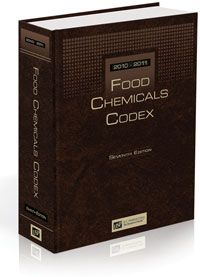Preserving a Gold Standard
Originally Published
Originally Published NO March 2010

FDA estimates that $2 trillion worth of products enter the United States from foreign countries each year. This means that each year there is a large opportunity for adulteration in any industry. The food and dietary supplement industries are no exception.
Government efforts can help curb these troubles, but, ultimately, the onus falls on producers of the products themselves. Just one slip-up can result in a nationwide recall.
The task is especially challenging, today. As new ingredient science emerges, supply chains involved in developing new products become bigger and far more vulnerable.
"Many ingredient sources, at the basic level, are still a cottage industry," says George Burdock, president and founder of Burdock Group, a safety and regulatory-compliance consulting firm serving the food, beverage, and dietary supplement industries. Burdock emphasizes the need for producers to routinely analyze for active ingredients, employ pharmacologists to examine products for adulteration, check for pesticides, and execute a host of other operations vital to ensuring safety and quality of products.
"In many foreign countries, avoiding regulations, or even the simplest oversight, is common," says Burdock, noting that many crops are grown in rural areas where government intervention and oversight is sparse.
Even at the wholesaler level, cases of adulteration or economic fraud can prove rampant. A common ingredient such as ginseng still has a big chance of getting to the market adulterated. "Panax ginseng and Panax quinquefolium are the two species of the genus Panax for which certain traditional values and uses are expected," says Burdock. "However, wholesalers will also try to sell 'Siberian' or even 'Brazilian' ginseng, neither of which have any relationship to the genus Panax and do not contain any of the active constituents for which ginseng is used-for instance, the ginsenosides."
How to Monitor a Complex Supply Chain
As opportunities for ingredient adulteration remain, market success means taking some expensive, but necessary, precautions.
BI Nutraceuticals (Long Beach, CA) sources ingredients from 35 countries. The company has a factory in Suzhou, China, (the only raw-material manufacturer to do so, it says), with its own processing and sourcing-surveillance facility. Botanists, etomologists, and soil experts are just some auxiliary staffed positions that keep the company in business.
"The global quality program that BI runs is a seven-figure dollar amount a year," says BI president and CEO George Pontiakos. But that number pales in comparison to the investment made by BI's customers-publicly traded companies and large, privately held organizations that invest tens of millions of dollars in their reputations in order to convince consumers that their products are of the utmost quality. "It's a very important investment that ensures our customers receive the highest-quality, specification-compliant [products] available," he says.
With a presence in China of 15 years and counting, Nutratech (West Caldwell, NJ), the exclusive distributor of Advantra Z bitter orange extract, devotes similar care to its partnerships overseas. "We ensure the quality of our proprietary bitter orange extract through collaboration," says Nutratech president Bob Green. "We help our Asia-based partners comply with the new good manufacturing practices and adopt Western quality controls, and we don't do this long-distance. We travel to Asia several times a year, and this results in ingredient quality and consistency."
Keeping Up with Internationally Recognized Standards

International ingredient standards can also help reduce the risk of product adulteration. One such standard system is offered by United States Pharmacopeia (USP; Rockville, MD), which published a seventh edition of its Food Chemicals Codex this February.
Market temptation is big, especially when it comes to popular items, so having internationally recognized standards can quell doubts of product authenticity. The newest Food Chemical Codex addresses this issue with standards for new ingredients, including three nucleotides and two DHA oils commonly found in infant formula, and the popular sweetener Rebaudioside A, or stevia. "If there's a certain spike in demand, one cannot always easily upgrade production, particularly for natural products," says Markus Lipp, PhD, USP director of food standards. "It takes a while for, say, a bush to grow before you can start harvesting its leaves. There can be a significant delay in adjusting production to market demands, resulting in a combination of high interest, high demand, and a relatively constant supply. This creates the temptation to make supplies last longer, through adulterating the genuine product."
Quality standards and the books that propose those quality standards are more critical because suppliers tend to be far away, geographically, making supply chains more and more complex. Having internationally available standards that are easily accessible for everyone can be a critical piece in the whole exercise.
The threat of one incident of contamination having endless effects is all too plausible. Just recall the recent peanut scandal in Georgia, USA, and the China melamine scandal. "Something that happens in rural China has full potential to affect us in Europe and the United States," says Lipp.
Government Assistance
While responsibility rests on the will of individual companies to put out clean products, FDA is also bumping up its foreign presence to help spread its mission globally.
Within the last 16 months, FDA has opened up 10 offices around the globe-Mexico City; Beijing, Shanghai, and Guangzhou, China; Mumbai and New Delhi, India; San Jose, Costa Rica; Santiago, Chile; Brussels, Belgium; and London.
Offices in Italy, Jordan, and Israel are also being projected.
Had FDA's Chinese posts been established before the 2008 melamine scandal, some experts believe the situation would have been handled differently.
"We would have already had the relationships with CIQ [China Inspection and Quarantine] and AQSIQ [the General Administration of Quality Supervision, Inspect, and Quarantine of the People's Republic of China]," says Benjamin England, former FDA regulatory counsel and owner and founder of FDAimports.com. "Now, I expect that any future incidents will be handled more smoothly. I would hope that we would be in a position to communicate with a foreign government far more rapidly."
Beyond the education and training efforts that will come with FDA's improved global presence, England emphasizes the need for more supply inspections.
"Since more than 50% of what Americans consume is not made in the United States, FDA has to figure out how to export a gold standard," says England. "They can export the philosophy and concepts involved in good manufacturing practices and risk management, and in controlling manufacturing facilities and controlling ingredients."
The Nutritional Outlook Podcast Episode 36: Best of the Industry Service Provider, Radicle Science
December 26th 2024Nutritional Outlook's managing editor, Sebastian Krawiec, interviews Radicle Science co-founders, Pelin Thorogood and Jeff Chen, MD. Radicle Science has been selected as this year's Best of the Industry, Service Provider.